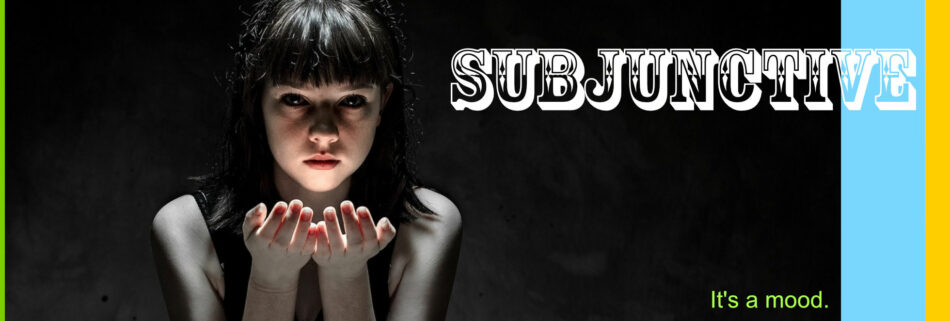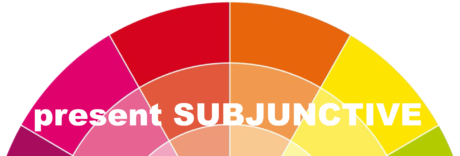The subjunctive mood has been known to break students.
Every serious Portuguese student runs straight into it. Some get hurt. Some get scared. But it doesn't have to be that way. The Portuguese Subjunctive is actually a rose with thorns. It's a beautiful part of the language that should be embraced and used with style, for it is truly cool. And you'll only find it in Portuguese, Spanish and Italian.
There are 3:
✻ The indicative mood is used to state facts & describe reality. Duh!
✻ The subjunctive mood is used to express doubt, uncertainty, and your wildest desires.
✻ The imperative mood is for commands and requests.
You will not find this mood in the English language! Portuguese is an extremely precise and elegant language.
When learning becomes a pleasure...
Goals happen. Semantica: Learning a language never felt so good.

Triggers for the Portuguese Subjunctive
Let's look at some sentences in English that are simple, but that activate the Portuguese Subjunctive mood.
I hope that I have a car when school starts.
When I buy my new Tesla, I'll drive it every day.
The trigger for this mood is always UNCERTAINTY. Something hypothetical, or a wish. There are 3 types or - DEGREES of uncertainty. Each is treated a bit differently...
➜ Extremely unlikely ➜ Imperfect Subjunctive
I hope that I have a car when school starts.
➜ Plausable ➜ Present Subjunctive
When I buy my new Tesla, I'll drive it every day.
➜ Likely but not a done deal ➜ Future Subjunctive
I want you to understand that each of these examples not only expresses uncertainty but in different degrees: very unlikely, hopeful, tangible.
These divide the subjunctive into three different tenses: present, future, and imperfect ~ each with its own conjugation rules.
The secret to happiness is to learn certain PATTERNS that occur over and over again. Do_not get overwhelmed by this. It's really not that hard. We're going to show you the most useful and popular uses and leave the less common forms for the advanced student.
The conjugations are no big deal -- it's all about learning when to use it.
Let's translate our three examples above:
If I were to have a unicorn, I'd ride her all the time. » Se eu tivesse um unicorn, andaria tempo todo. (imperfect subjunctive)
I hope that I have a car when school starts. » Espero que tenha um carro quando as aulas começarem. (present subjunctive + future subjunctive *this is advanced 😳)
When I buy my new Tesla, I'll drive every day. » Quando eu comprar meu Tesla novo, vou dirigir todo dia. (future subjunctive)
Since this post is really just a launchpad to individual posts for about of theses subjunctive tenses: present, future & imperfect ~ I'll simply present a description and a useful example of each case. A then link out of here before it gets too Grammarly.
the Portuguese Subjunctive ~ three flavors
The Portuguese Subjunctive is a mood (a manner of expression). Moods come in versions: past, present, and future. We call these verb tenses. And that's the cause of all the anxiety. You have to learn three more conjugations for every verb. But I'm a survivor of all this and no one stressed-out more than eu. And, I'm here to report: it's no_big_deal. The key is to learn the most-used ones first and let the more complicated versions gradually invade your head.
the Imperfect Subjunctive
Also called, the Past Subjunctive.
Use this tense to talk about things that are or were, very unlikely to happen.
the Present Subjunctive
Use this tense to talk about things that are hypothetical but hopeful to occur.
the Future Subjunctive
Use this tense to talk about things that are likely to occur in the future, but that hasn't yet happened. .
If you get existential about these or try to take their definition too literally, your head will begin to ache. So, don't. Just start using it. You will get the feel for it, trust me.
Let's find out. Here's a little test. For each of these sentences, I want you to quickly say whether it needs the imperfect, present, or future subjunctive treatment:
(a) If I pay for your drink will you come with us?
(b) I hope that she pays for my drink!
(c) If I were to pay your bar tab, I'd be a poor man.
If you answered future, present, imperfect you are way ahead of the game!
This mood is called the Subjunctive because it supposes things ~ it's subjective. Here's how Wikipedia puts it:
Learning Portuguese doesn't have to be hard!

 the Present Subjunctive
the Present Subjunctive  the Future Subjunctive
the Future Subjunctive
Comentários